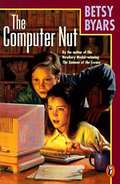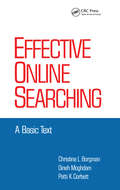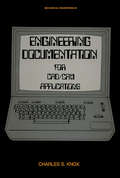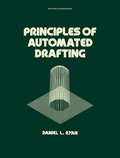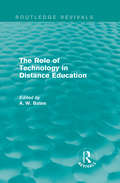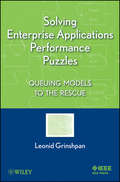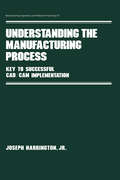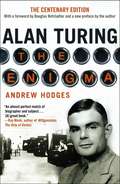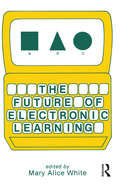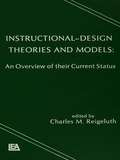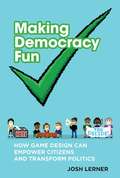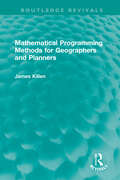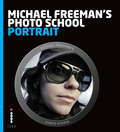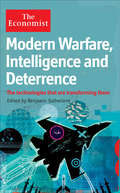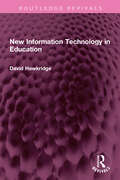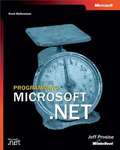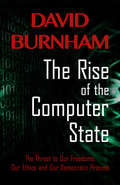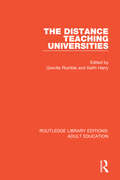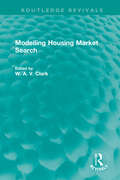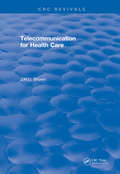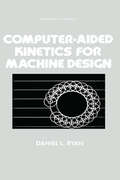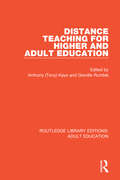- Table View
- List View
The Computer Nut
by Betsy ByarsTen-year-old Kate begins a communication exchange on a computer with someone purporting to be from outer space, who says he is going to pay a visit to Earth soon.
Effective Online Searching: A Basic Text
by Christine L. Borgman Dineh Moghdam Patti K. CorbettThis book focuses on searching and hands-on experience, which makes the text suitable for those who wish to learn searching for their own use as well. It is intended for those who will act as search intermediaries, accepting questions from clients and performing the searches.
Engineering Documentation for CAD/CAM Applications (Dekker Mechanical Engineering Ser. #30)
by Charles S. KnoxThis book emphasizes the importance of consistent, well-planned, and computer-oriented engineering documentation systems to engineering, manufacturing, and accounting. It discusses the systems needed to optimize flow of information and increase the efficiency of modern CAD/CAM systems.
Principles of Automated Drafting (Mechanical Engineering Ser. #28)
by Daniel L. RyanThis book introduces the reader to each phase of the subject, step-by-step to enable one to use the various automated drafting devices, instruments and technique of application. It shows the way to produce acceptable drafting in the framework of high productivity.
The Role of Technology in Distance Education (Routledge Revivals)
by Tony BatesThis book, first published in 1984, provides a comprehensive review of the range of technology that was being used in distance education. Technological developments in word processing, video-disc and viewdata as well as computer-based learning had revolutionised the potential for distance education. These developments required the role of more ’conventional’ distance learning media, such as broadcasting, tuition and text, to be reassessed. This book, written by international experts in the field, explored the state of the art at the time, and also provided their ideas on how future developments were likely to evolve. This book is ideal for those studying education and communications.
Solving Enterprise Applications Performance Puzzles
by Leonid GrinshpanPoorly performing enterprise applications are the weakest links in a corporation's management chain, causing delays and disruptions of critical business functions. This groundbreaking book frames enterprise application performance engineering not as an art but as applied science built on model-based methodological foundation. The book introduces queuing models of enterprise application that visualize, demystify, explain, and solve system performance issues. Analysis of these models will help to discover and clarify unapparent connections and correlations among workloads, hardware architecture, and software parameters.
Understanding the Manufacturing Process: Key to Successful Cad/cam Implementation
by Joseph Harrington Jr.This book approaches manufacturing as a basic problem of making a desired end-product from bulk raw materials. It encompasses the entire gamut of activities from product concept to maintenance of past products in the field, and everything in between.
Windows® 7 Plain & Simple
by Marianne Moon Jerry JoyceGet the fast facts that make learning Windows 7 plain and simple! This no-nonsense guide uses easy, numbered steps and concise, straightforward language to show the most expedient way to perform tasks and solve problems in Windows 7. Here's what you'll learn to do: Run programs, control gadgets, play games. Send e-mail, browse the Web, and share your files. Organize your digital media, including photos, music, and videos. Burn CDs and DVDs; make your own movies. Set up your printer and a simple home network. Manage security settings and perform easy tune-ups and fixes. Here's how you'll learn it: Jump in wherever you need answers. Easy-to-follow steps and screenshots show you exactly what to do. Handy tips teach you new techniques and shortcuts. Quick TRY THIS! exercises help you apply what you've learned right away. offer the CD/DVD content as a free download via OReilly Medias Digital Distribution services. To download this content, please visit OReillys web site, search for the title of this book to find its catalog page, and click on the link below the cover image (Examples, Companion Content, or Practice Files). Note that while we provide as much of the media content as we are able via free download, we are sometimes limited by licensing restrictions. Please direct any questions or concerns to booktech@oreilly.com.
Adaptive Technologies for Training and Education
by Paula J. Durlach Alan M. LesgoldThis edited volume provides an overview of the latest advancements in adaptive training technology. Intelligent tutoring has been deployed for well-defined and relatively static educational domains such as algebra and geometry. However, this adaptive approach to computer-based training has yet to come into wider usage for domains that are less well defined or where student-system interactions are less structured, such as during scenario-based simulation and immersive serious games. In order to address how to expand the reach of adaptive training technology to these domains, leading experts in the field present their work in areas such as student modeling, pedagogical strategy, knowledge assessment, natural language processing and virtual human agents. Several approaches to designing adaptive technology are discussed for both traditional educational settings and professional training domains. This book will appeal to anyone concerned with educational and training technology at a professional level, including researchers, training systems developers and designers.
Alan Turing: The Enigma (The Centenary Edition)
by Andrew HodgesIt is only a slight exaggeration to say that the British mathematician Alan Turing (1912-1954) saved the Allies from the Nazis, invented the computer and artificial intelligence, and anticipated gay liberation by decades--all before his suicide at age forty-one. This classic biography of the founder of computer science, reissued on the centenary of his birth with a substantial new preface by the author, is the definitive account of an extraordinary mind and life. A gripping story of mathematics, computers, cryptography, and homosexual persecution, Andrew Hodges's acclaimed book captures both the inner and outer drama of Turing's life. Hodges tells how Turing's revolutionary idea of 1936--the concept of a universal machine--laid the foundation for the modern computer and how Turing brought the idea to practical realization in 1945 with his electronic design. The book also tells how this work was directly related to Turing's leading role in breaking the German Enigma ciphers during World War II, a scientific triumph that was critical to Allied victory in the Atlantic. At the same time, this is the tragic story of a man who, despite his wartime service, was eventually arrested, stripped of his security clearance, and forced to undergo a humiliating treatment program--all for trying to live honestly in a society that defined homosexuality as a crime.
The Future of Electronic Learning
by Mary Alice WhiteFirst Published in 1983. Routledge is an imprint of Taylor & Francis, an informa company.
Instructional Design Theories and Models: An Overview of Their Current Status
by Charles M. ReigeluthInstructional Design Theories and Models is a thorough yet concise overview of eight of the most comprehensive and best-known attempts to integrate knowledge about effective and appealing instruction. Chapters were written by the original theorists to provide a more accurate and behind-the-scenes look at the theories' development. Instructional Des
Making Democracy Fun
by Josh LernerAnyone who has ever been to a public hearing or community meeting would agree that participatory democracy can be boring. Hours of repetitive presentations, alternatingly alarmist or complacent, for or against, accompanied by constant heckling, often with no clear outcome or decision. Is this the best democracy can offer? In Making Democracy Fun, Josh Lerner offers a novel solution for the sad state of our deliberative democracy: the power of good game design. What if public meetings featured competition and collaboration (such as team challenges), clear rules (presented and modeled in multiple ways), measurable progress (such as scores and levels), and engaging sounds and visuals? These game mechanics would make meetings more effective and more enjoyable -- even fun. Lerner reports that institutions as diverse as the United Nations, the U.S. Army, and grassroots community groups are already using games and game-like processes to encourage participation. Drawing on more than a decade of practical experience and extensive research, he explains how games have been integrated into a variety of public programs in North and South America. He offers rich stories of game techniques in action, in children's councils, social service programs, and participatory budgeting and planning. With these real-world examples in mind, Lerner describes five kinds of games and twenty-six game mechanics that are especially relevant for democracy. He finds that when governments and organizations use games and design their programs to be more like games, public participation becomes more attractive, effective, and transparent. Game design can make democracy fun -- and make it work.
Mathematical Programming Methods for Geographers and Planners (Routledge Revivals)
by James KillenOriginally published in 1983, this was the first text to offer an in-depth treatment of mathematical programming methods explained from first principles. It considers all the major programming techniques and fully explains key terms, illustrates theories with detailed examples and shows how the various skills are applied in practice. It will be invaluable in both the academic world and to policy formulators and planners, who make extensive use of the methods described.
Michael Freeman's Photo School: Portrait (Michael Freeman's Photo School)
by Michael FreemanAt some point, all photographers are called upon to shoot a proper portrait - combining technical skill with personable demeanour to capture someone in their best possible light. Michael Freeman teaches you how to achieve flattering portrait results with a variety of both traditional and modern styles.Learn how to set your subjects at ease and bring out their natural beauty with a friendly yet professional attitude. Feel confident giving directions on posing and stance with a thorough review of the classic approaches, from head-and-shoulder shots to full-length compositions, and everything in between.Take creative control of your portrait sessions by learning to manipulate the light to your own ends - whether that means bouncing sunlight o a reflector or building your own studio setups with multiple fl ash units. The complex science of photographic lighting is explained in straightforward and easy-to-understand language, with abundant and inspirational examples. Finally, master the fundamentals of post-production finishing techniques to make sure every portrait looks its absolute best. Your subjects will thank you for it!
Mind at Play: The Psychology of Video Games
by Geoffrey. R. Loftus Elizabeth F. LoftusExamines the psychological processes involved in playing video games, discusses behavior problems frequent players can develop, and compares video games to other fads of the past.
Modern Warfare, Intelligence and Deterrence: The technologies that are transforming them (Economist Books)
by Benjamin SutherlandThe Panzerfaust-3, a German shoulder-fired heat-seeking antitank missile, can punch through a metre of solid steel-far more than any armoured vehicle could carry. The MPR-500, an Israeli precision bomb, can hammer through several storeys of a building and explode on a chosen floor. These and myriad other military and intelligences technologies are changing the world. This Economist book describes these emerging technologies and places them in the larger context of today's politics, diplomacy, business and social issues. It shows how efforts to win wars or keep the peace are driving enormous and multifold technological advances. Broadly speaking, defence technologies will continue to provide enormous advantages to advanced, Western armed forces. The book is organised into five parts: land and sea, air and space, the computer factor, intelligence and spycraft, and the road ahead, which examines the coming challenges for western armies, such as new wars against insurgents operating out of civilian areas. Comprising a selection of the best writing on the subject from the Economist, each part has an introduction linking the technological developments to political, diplomatic, business and other civilian matters. For anyone who wants to know just how smart the global war, defence and intelligence machine is, this will be revealing and fascinating reading.
New Information Technology in Education (Routledge Revivals #32)
by David HawkridgeFirst published in 1983, New Information Technology in Education surveyed developments in the field of information technology and demonstrated how it could be used to improve the quality of education. The book considered the experience of a wide range of countries, including the United States, Japan and those in Europe. While explaining the potential improvements that the new technology could bring, this book also reviewed the problem areas and helped educationalists to evaluate the relevance of the new technology for their own work. In an age of teaching via Zoom videos, it is interesting to take a look at a time when information technology in education was at its nascent stage. This book will be of interest to teachers and students of history, education, technology and pedagogy.
Programming Microsoft® .NET
by Jeff ProsiseThe Microsoft .NET initiative builds on industry standards to make interoperable software services available anywhere, on any device, over the Internet. Behind the initiative is the Microsoft .NET Framework, which combines a managed run-time environment with one of the richest class libraries ever invented to make building and deploying Web-enabled applications easier than ever. Find out how to leverage the full power of the .NET Framework with this definitive, one-stop resource, wri tten by a leading authority in his trademark easy-to-follow, conversational style. You'll learn about the key programming models embodied in the .NET Framework, including Windows® Forms, Web Forms, and XML Web services. And you'll benefit from a wealth of how-to examples, code samples, and complete working programs in C#. Topics covered in this guide include: Hello, .NET Types and Exceptions The .NET Framework Class Library Windows Forms Web Forms Web Controls User Controls Custom Controls Web Applications Microsoft ASP.NET Security XML Web Services Microsoft ADO.NET XML Multithreading Remoting CD-ROM FEATURES: A fully searchable electronic version of the book Source code for more than 60 complete sample programs and components written in C# The Microsoft .NET Framework SDK, plus Service Pack 1 A Note Regarding the CD or DVD The print version of this book ships with a CD or DVD. For those customers purchasing one of the digital formats in which this book is available, we are pleased to offer the CD/DVD content as a free download via O'Reilly Media's Digital Distribution services. To download this content, please visit O'Reilly's web site, search for the title of this book to find its catalog page, and click on the link below the cover image (Examples, Companion Content, or Practice Files). Note that while we provide as much of the media content as we are able via free download, we are sometimes limited by licensing restrictions. Please direct any questions or concerns to booktech@oreilly.com.
The Rise of the Computer State
by David BurnhamThe Rise of the Computer State is a comprehensive examination of the ways that computers and massive databases are enabling the nation's corporations and law enforcement agencies to steadily erode our privacy and manipulate and control the American people. This book was written in 1983 as a warning. Today it is a history. Most of its grim scenarios are now part of everyday life. The remedy proposed here, greater public oversight of industry and government, has not occurred, but a better one has not yet been found. While many individuals have willingly surrendered much of their privacy and all of us have lost some of it, the right to keep what remains is still worth protecting.
The Distance Teaching Universities (Routledge Library Editions: Adult Education)
by Greville Rumble, Keith HarryOriginally published in 1982 this volume provides nine case studies of particular distance teaching universities in Canada, China, Cost Rica, Germany, Israel, Pakistan, Spain, Venezuela and the UK. These universities were mainly founded in the 1970s to teach only at a distance. The book considers the provision of distance education by universities in general and the development and characteristics of the distance teaching universities in particular. Chronicling the emergence of new university structures between 1971-1981, the book also provides an appraisal of their performance in the early years.
Modelling Housing Market Search (Routledge Revivals)
by W. A. V. ClarkOriginally published in 1982, this book contains research in the area of econometric modelling in the housing market, including that which has extended to the use of search models. The subjects covered include the importance of racial differences, spatial aspects of residential search and information provision and its effect on the behaviour of the buyers. The combination of careful analytic modelling, empirical testing and speculative discussions of the role of agents in the search process provides an innovative and imaginative approach to the interesting problems of understanding the individual behaviour in complex contexts such as the urban housing market.
Telecommunication for Health Care (CRC Press Revivals)
by J.H.U. BrownThere are relatively few references in this volume. This occurs for two reasons. In the first place, the Federal government has sponsored most of the communication experiments in health care and many of the results are buried in government reports. Some of these have been included. Secondly, although very large projects have been initiated and some may set a pattern for future health care, they have not attracted merited attention.
Computer-Aided Kinetics for Machine Design (Mechanical Engineering Ser. #7)
by Daniel L. RyanThis book presents a study of computer-aided machine design and explains the fundamental concepts of kinematics and machine element design in lay terms. It is useful for those concerned with developing new programs in computer-aided design, in both industry and education.
Distance Teaching For Higher and Adult Education (Routledge Library Editions: Adult Education)
by Anthony Tony Kaye And Greville RumbleOriginally published in 1981 this volume provides a detailed analysis of the factors - strategic, pedagogic, operational, organisational and financial -which should be taken into account in the planning and running of large-scale, centralised distance education systems at the higher education level. The book uses evidence drawn from Open University type institutions in Canada, Costa Rica, Germany, Iran, Israel, Pakistan, Spain, Sri Lanka, Venezuela and the UK.
